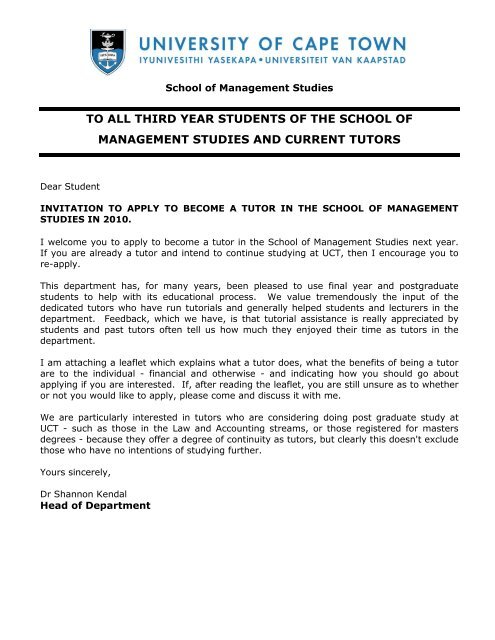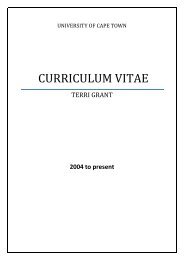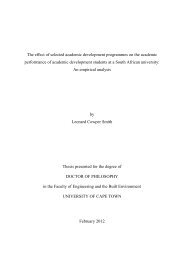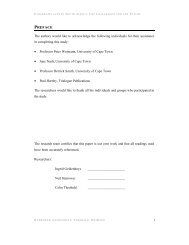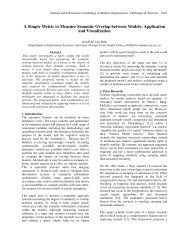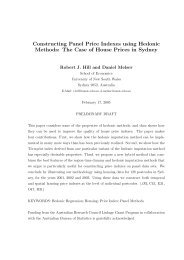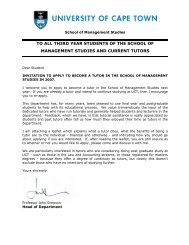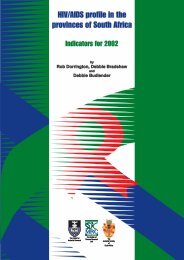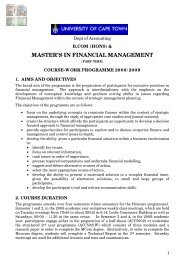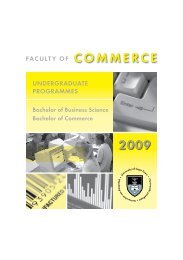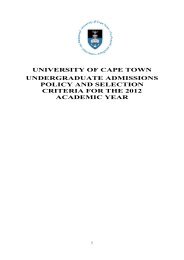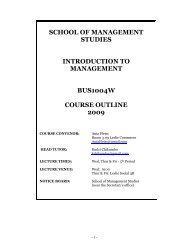TO ALL THIRD YEAR STUDENTS OF THE
TO ALL THIRD YEAR STUDENTS OF THE
TO ALL THIRD YEAR STUDENTS OF THE
Create successful ePaper yourself
Turn your PDF publications into a flip-book with our unique Google optimized e-Paper software.
School of Management Studies<br />
<strong>TO</strong> <strong>ALL</strong> <strong>THIRD</strong> <strong>YEAR</strong> <strong>STUDENTS</strong> <strong>OF</strong> <strong>THE</strong> SCHOOL <strong>OF</strong><br />
MANAGEMENT STUDIES AND CURRENT TU<strong>TO</strong>RS<br />
Dear Student<br />
INVITATION <strong>TO</strong> APPLY <strong>TO</strong> BECOME A TU<strong>TO</strong>R IN <strong>THE</strong> SCHOOL <strong>OF</strong> MANAGEMENT<br />
STUDIES IN 2010.<br />
I welcome you to apply to become a tutor in the School of Management Studies next year.<br />
If you are already a tutor and intend to continue studying at UCT, then I encourage you to<br />
re-apply.<br />
This department has, for many years, been pleased to use final year and postgraduate<br />
students to help with its educational process. We value tremendously the input of the<br />
dedicated tutors who have run tutorials and generally helped students and lecturers in the<br />
department. Feedback, which we have, is that tutorial assistance is really appreciated by<br />
students and past tutors often tell us how much they enjoyed their time as tutors in the<br />
department.<br />
I am attaching a leaflet which explains what a tutor does, what the benefits of being a tutor<br />
are to the individual - financial and otherwise - and indicating how you should go about<br />
applying if you are interested. If, after reading the leaflet, you are still unsure as to whether<br />
or not you would like to apply, please come and discuss it with me.<br />
We are particularly interested in tutors who are considering doing post graduate study at<br />
UCT - such as those in the Law and Accounting streams, or those registered for masters<br />
degrees - because they offer a degree of continuity as tutors, but clearly this doesn't exclude<br />
those who have no intentions of studying further.<br />
Yours sincerely,<br />
Dr Shannon Kendal<br />
Head of Department
Tutoring - What's it all about<br />
What is a tutor<br />
A tutor is a student who is responsible for teaching small groups of students, on a more<br />
personal basis, in a classroom situation. The tutorial sessions allow students to explore the<br />
more practical aspects of the course (e.g. case studies), get feedback and solutions to<br />
tutorial assignments, as well as providing an opportunity for students to solve any problems<br />
he/she may be having with the course.<br />
What does a tutor's job entail<br />
Liaising<br />
Tutors are required to meet frequently (usually on a weekly or bi-weekly basis) with the<br />
lecturer of the course. Here, the lecturer will brief the tutors as to the work that is required<br />
for the following week's tutorial sessions. In addition, any problems which the lecturer or<br />
tutors are experiencing are raised and discussed, in order to ensure the smooth running of<br />
the course. Feedback of a general nature is also offered at these meetings.<br />
Responsibility<br />
The tutor is usually expected to take 2 tutorials a week (this may vary according to the<br />
course involved). Each tutorial consists of between 15-20 students. Therefore, a tutor is<br />
responsible for about 40 students in total.<br />
The core activities of a tutor can be summarised as follows:<br />
preparation work for tutorials<br />
taking 2 tutorials a week<br />
marking tutorials (and often tests as well)<br />
frequent meetings with the lecturer<br />
assisting students who are experiencing difficulties on a one-on-one basis<br />
invigilate tests and exams<br />
The job thus entails 4 – 9 hours of input a week. This will vary depending on the course<br />
involved and the time of the year.<br />
Tutors Workshop<br />
At the start of the academic year, we run a workshop for tutors to help them to be effective<br />
from the first day of term and to allow them to establish a working relationship with the<br />
lecturers whose courses they will tutor.
What characteristics should a tutor have<br />
A tutor should be:<br />
a good communicator - in order to liaise with both students and staff members.<br />
confident - in order to speak in front of a class of students.<br />
organised - in order to plan one's tutorials and meet marking deadlines.<br />
a good listener - to student's academic problems.<br />
an approachable person - students should feel free to approach you about any<br />
problems that they are experiencing with the course.<br />
academically sound - so that one's studies do not suffer at the expense of tutorial<br />
commitments (and vice versa)<br />
enthusiastic - in order to stimulate interest in the course and to motivate students<br />
to work.<br />
reliable and responsible - so that both the students and the lecturer can rely on<br />
you and trust you.<br />
desirous of helping students<br />
What are the benefits of tutoring<br />
tutors receive monthly remuneration. At this stage, the actual amount for 2009<br />
hasn't been finalised by the University but we would expect a tutor who carries a full<br />
tutoring load to earn in the region of R7 000 for the year.<br />
it improves your interpersonal and communication skills.<br />
it allows you to become more involved in the department and thus in certain<br />
departmental decisions.<br />
it gives you an opportunity to get to know the staff on a more personal basis.<br />
it enhances your own understanding of the work.<br />
it reflects good leadership and communication skills on your CV, as well as indicating<br />
recognition by the department of your superior abilities.<br />
it is a convenient and enjoyable part-time job.<br />
it is extremely rewarding in terms of job satisfaction.<br />
If you are interested in becoming a tutor in the School of Management<br />
Studies for the 2010 academic year, please complete the attached form and<br />
return forms before the 31 st of October 2009 to the School of Management<br />
Studies reception office.
School of Management Studies<br />
TU<strong>TO</strong>R APPLICATION FORM 2010<br />
Student No. Degree Special Field<br />
Surname<br />
First Name<br />
Date of Birth<br />
Term Address<br />
Email<br />
address<br />
Vacation Address<br />
(Term)<br />
Cell number<br />
Email<br />
(Vac)<br />
Please advise us if your phone numbers change!<br />
Course/s which you wish to tutor (only Business Science and PGD courses)<br />
COURSE CODE<br />
COURSE NAME<br />
Results achieved in the above courses (if applicable)<br />
COURSE CODE COURSE NAME MARK (%)<br />
Have you any previous tutoring/teaching experience Y N<br />
If yes, please attached further details<br />
Please note: ..... No student, once accepted to tutor, may conduct additional<br />
classes, tutorials or seminars of any nature, for financial reward,<br />
other than that agreed in their contract with the University.<br />
Signed:____________________________<br />
Date:<br />
Return forms by 31 October 2009 to the School of Management<br />
Studies RECEPTION office (Level 4, Leslie Commerce Bldg).


